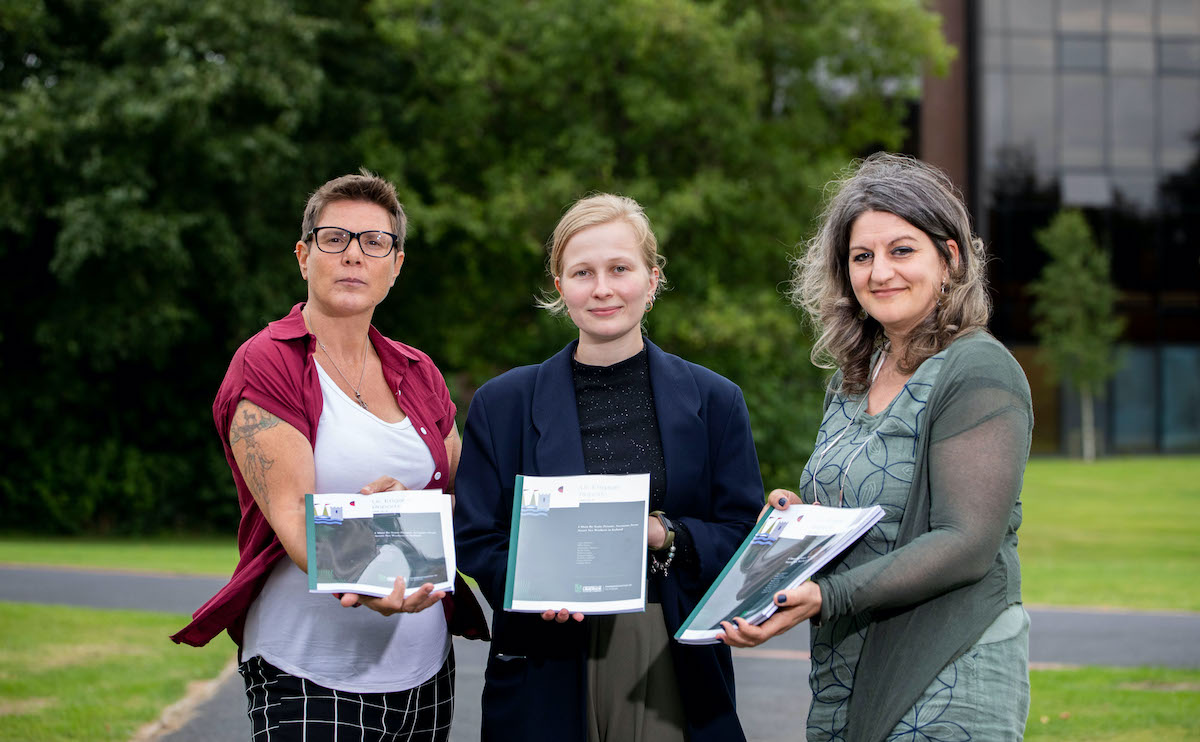

Community
UL Sex Workers Report finds street sex workers face ‘discriminatory behaviour’ from Gardaí
UL Sex Workers Report – Pictured during the launch of ‘I Must Be Some Person: Accounts from Street Sex Workers in Ireland’, were, Billie Stoica, Report Coordinator, Anastasiia Zubareva, Research Team and Dr. Anca Minescu, author of the report and lecturer in psychology at UL. Picture by Alan Place.
Department of Justice funded research recommends full decriminalisation of sex work

New research published by the University of Limerick has revealed that street sex workers have faced discriminatory behaviour by An Garda Síochána.
The UL Sex Workers Report, funded by the Department of Justice, reveals that the 2017 Criminal Law Act has drastically affected the lives of street sex workers in urban areas. The report found that one in five street sex workers interviewed had experience of being sexually exploited by the Gardaí.
The UL Sex Workers Report by the research team at University of Limerick will be officially launched this Thursday. The researchers argue the study is important because the voices of these street workers have largely been silent in the national discussion around legislative changes governing sex work.
The report, ‘I Must Be Some Person: Accounts from Street Sex Workers in Ireland’, investigated street workers’ knowledge and experience of the legislation around sex work since the introduction of the 2017 Criminal Law (Sexual Offences) Act.
The findings are based on interviews with a sample of 25 street sex workers based in Dublin (15) and Limerick (10), conducted by a team of researchers and peer-researchers, in a collaboration between the University of Limerick and Gender, Orientation, Sexual Health, HIV (GOSHH).
The report found a deep mistrust by sex workers towards An Garda Síochána. It found that sex workers who face rape, violence, or other crimes felt discouraged to report such incidents to Gardai for a range of reasons, including:
– a history of trauma inflicted by aggressive Garda tactics from the past among sex workers;
– the belief and experience of some officers sexually exploiting street sex workers and abusing their power;
– previous cases of sex workers reporting incidents of physical assault or rape, which were dismissed or mishandled, not leading to receiving help or justice, and
– a wide-spread stigma around sex work in the Irish society, and hence, sex workers being afraid of publicity
The report provides recommendations for the Department of Justice, which is currently engaged in a review of the 2017 Act, regarding the law and policy around sex work, which include:
– The full decriminalisation of sex work, including the purchase of sexual services
– An end to the policing of sex workers by An Garda Síochána
– Encouraging the redirection of funding from An Garda Síochána to sex worker led organisations
Dr Anca Minescu, author of the report and lecturer in psychology at University of Limerick, said, “Our findings show our current law on sex work negatively affects lives, safety, and wellbeing of sex workers. Portraying all sex workers in Ireland as ‘exploited victims’ and the way the Gardaí are interacting with the street sex workers contribute to violence and stigmatization.
“This enables very serious incidents of Garda misconduct against sex workers, including sexual assault and verbal abuse, and false legal information surrounding sex work spread by others. This also leads to further marginalisation and isolation of an already economically and psychologically vulnerable population,” Dr Minescu explained.
According to the research team, the report shows that the state’s law and policing approach, which portrays and treats all sex workers as ‘exploited victims’, instead of treating “sex-work as work,” alongside wider societal stigma and discourse, causes additional direct and indirect harm.
Billie Stoica, the coordinator of the funded project, explained, “The street sex workers who spoke to us had so many aspects of their lives to juggle. Caring for parents and children, negotiating housing, achieving education, or managing addiction. How sex work is policed only added to the pressure they were under and left them with little or no access to justice.”
The whole research team of authors and contributors, including peer-researchers, acknowledged the bravery of the street sex workers who participated in this project and shared their stories of survival.
The report includes direct quotes from sex workers, “We’re actually good people.” “We’re people that are just living every day, and we’re alive.”
“It’s not like working in a shop, but it is work. I’m not robbing people. I’m going out and making me own money”.
Dr Minescu explained, “It is crucial to understand how sex workers experience the law, and how the law impacts on their lives, while considering their voices, their interpretations, and their own positioning in society, from a psychological perspective. Given that there is an upcoming legislative review, we are hoping the results of this research will feed into the review process.
‘I Must Be Some Person: Accounts from Street Sex Workers in Ireland’, is a University of Limerick Collaboration with GOSHH, funded by the Dormant Accounts Scheme from the Department of Justice and Equality and Anti-Human Trafficking Department.
For more information on the UL Sex Workers Report go HERE
For more news stories, go HERE














